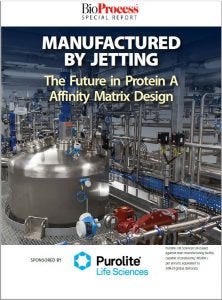- Sponsored Content
- Chromatography
Manufactured by Jetting: The Future in Protein A Affinity Matrix DesignManufactured by Jetting: The Future in Protein A Affinity Matrix Design
Sponsored by Purolite
 Protein A affinity chromatography continues to be the preferred method for commercial purification of antibodies because of its high selectivity and robust resin performance over repeated purification cycles. Reports estimate that US$125 billion of yearly sales will be generated from monoclonal antibody (MAb) products by 2020 (1). Most of those will be purified by largescale protein A affinity chromatography. With the continued growth and commercial importance of MAb production, availability of high-quality resin material and options for secondary sourcing are growing concerns. As current commercial patents for therapeutic antibodies expire and biosimilars enter the market, the cost of manufacturing will be of increasing interest.
Protein A affinity chromatography continues to be the preferred method for commercial purification of antibodies because of its high selectivity and robust resin performance over repeated purification cycles. Reports estimate that US$125 billion of yearly sales will be generated from monoclonal antibody (MAb) products by 2020 (1). Most of those will be purified by largescale protein A affinity chromatography. With the continued growth and commercial importance of MAb production, availability of high-quality resin material and options for secondary sourcing are growing concerns. As current commercial patents for therapeutic antibodies expire and biosimilars enter the market, the cost of manufacturing will be of increasing interest.
The workhorses of today’s commercial MAb purification processes still are porous resins based on styrenic, acrylic, or agarose chemistry and produced by the same batch emulsification methodology that has been used since the mid- 1900s. That technology produces resins that have a wide particle-size distribution and require extensive screening to achieve the column performance demanded in modern processes. By contrast, a scalable continuous emulsification technology termed jetting can be used to produce beads with a narrow particle-size distribution, without sieving, and resulting in almost quantitative yield. Here, we present performance data of a new protein A resin, Praesto® Jetted A50, manufactured by jetting technology. Interestingly, the particle-size distribution has been shown to have a significant effect on resistance to fouling (2, 3).
You May Also Like






